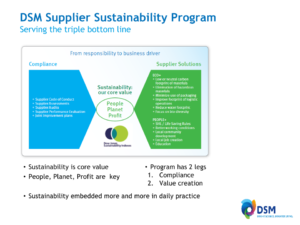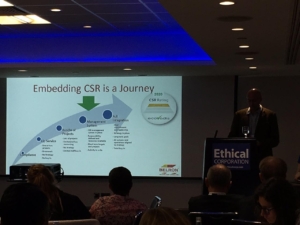Sustainability leaders from an impressive lineup of brands gathered last month at Ethical Corp’s 11th Sustainable Supply Chain Summit in London where they discussed on how to drive collaboration and go deeper in their supply chain to deliver bigger positive impact for stakeholders. EcoVadis attended several sessions during this two-days conference and have met with a lot of sustainability leaders who are eager to leverage their sustainability efforts.
During the session Build business relationships – What do the procurement teams think of integrating sustainability into their business, the Program Manager of DSM, talked about what sustainability means to sustainability folks. He also talked about DSM’s sustainability strategy which comprises of the following axes:
- driving sustainable markets;
- using sustainability as a business growth driver; and
- securing sustainable operations.

In another session Prove the value of having a responsible supply chain as a source of competitive advantage, one company’s key Supply Chain Sustainability focus included:
- eliminating duplication of auditing / questionnaires (their audit takes approximately 6 weeks to get results, and 9 months to see any changes on corrective actions);
- making sure that sustainability issues are talked about everywhere, regardless of whether the person is a “sustainable procurement specialist”; and
- measuring progress as supply chains change dramatically over 2, 3, 5 years…
This company realizes that:
- any process efficiency generally gives both cost savings and environmental savings;
- the best sustainability drives come from outside of the sustainability team, because people need to own projects to succeed;
- sustainability is a long game – You won’t get everyone on board now, but you’ll get the train moving and others will join; and
- the challenge for the coming years will be sub-tiers and the transparency associated with them.
During the Supplier capacity building study: Improve transparency and operational standards through supplier collaboration session, a Head of Risk and Assurance reported that sustainability is being advocated internally at his company because driving quality is perceived as more important than just driving a few cents off the cost. The three common reactions when buyers speak to suppliers about sustainability are:
- Shock – What, me!? I have to do this?
- Pay – I have to pay for this burden as well
- Consequences – Ok, I believe you, but what happens if I refuse to take part?
It looks that the main challenge for them would be to give enough information to their suppliers (and maybe train them) so that they feel more at ease with the Sustainability topic.

Belron’s Head of of Environmental Efficiency, Justin Bazalgette shared insights into their sustainability improvement plans amongst subsidiaries at the CR Reporting and Communications Summit which was being held next door.
EcoVadis attended an in-depth Modern Slavery Act workshop were they talked on the risk of modern slavery in the supply chain. During this workshop we discussed on how many tiers down the supply chain we need to go to detect modern slavery -where you (morally) feel you should go vs what your policy states. The problem is that companies will be focusing only on tiers which affect their brands more, not necessarily those where the real risks lie. We realised that, for the moment, very few companies have put in place effective UK Modern Slavery Act statements.
Lastly, during the session Supply Chain Risk management – embedding technologies to successfully manage risk, the panelists mentioned that companies are not leveraging their internal data well enough, however, it is key for driving sustainability efforts and Circular Economy.
It seems that driving sustainability beyond Tier 1 suppliers is difficult to standardize for the moment, and only really occurs in special cases, or at a basic policy level by forcing suppliers’ suppliers to accept codes of conduct.
You might also want to read:
EcoVadis at International Railway Union Sustainability Conference
How Can Companies Adapt To The EU Directive On Non-Financial Reporting?






















